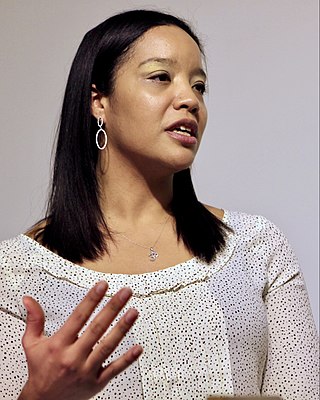Related Research Articles

Existentialism is a form of philosophical inquiry that explores the issue of human existence. Existentialist philosophers explore questions related to the meaning, purpose, and value of human existence. Common concepts in existentialist thought include existential crisis, dread, and anxiety in the face of an absurd world and free will, as well as authenticity, courage, and virtue.
Analytic philosophy is a broad movement or tradition within philosophy, focused on analysis and popular in the Western world and particularly the Anglosphere, which began around the turn of the 20th century in the contemporary era in Germany, the United Kingdom, United States, Canada, Australia, New Zealand, and Scandinavia, and continues today.

Black studies or Africana studies, is an interdisciplinary academic field that primarily focuses on the study of the history, culture, and politics of the peoples of the African diaspora and Africa. The field includes scholars of African-American, Afro-Canadian, Afro-Caribbean, Afro-Latino, Afro-European, Afro-Asian, African Australian, and African literature, history, politics, and religion as well as those from disciplines, such as sociology, anthropology, cultural studies, psychology, education, and many other disciplines within the humanities and social sciences. The field also uses various types of research methods.
Christian existentialism is a theo-philosophical movement which takes an existentialist approach to Christian theology. The school of thought is often traced back to the work of the Danish philosopher and theologian Søren Kierkegaard (1813–1855) who is widely regarded as the father of existentialism.

Kwame Akroma-Ampim Kusi Anthony Appiah is a British American philosopher and writer who has written about political philosophy, ethics, the philosophy of language and mind, and African intellectual history. Appiah was the Laurance S. Rockefeller University Professor of Philosophy at Princeton University, before moving to New York University (NYU) in 2014. He holds an appointment at the NYU Department of Philosophy and NYU's School of Law. Appiah was elected President of the American Academy of Arts and Letters in January 2022.
African philosophy is the philosophical discourse produced in Africa or by indigenous Africans. African philosophers are found in the various academic fields of present philosophy, such as metaphysics, epistemology, moral philosophy, and political philosophy.
Feminism is a collection of movements aimed at defining, establishing, and defending equal political, economic, and social rights for women. Existentialism is a philosophical and cultural movement which holds that the starting point of philosophical thinking must be the individual and the experiences of the individual, that moral thinking and scientific thinking together are not sufficient for understanding all of human existence, and, therefore, that a further set of categories, governed by the norm of authenticity, is necessary to understand human existence. This philosophy analyzes relationships between the individual and things, or other human beings, and how they limit or condition choice.
Lewis Ricardo Gordon is an American philosopher at the University of Connecticut who works in the areas of Africana philosophy, existentialism, phenomenology, social and political theory, postcolonial thought, theories of race and racism, philosophies of liberation, aesthetics, philosophy of education, and philosophy of religion. He has written particularly extensively on Africana and black existentialism, postcolonial phenomenology, race and racism, and on the works and thought of W. E. B. Du Bois and Frantz Fanon. His most recent book is titled: Fear of Black Consciousness.
Philosophy is the study of general and fundamental problems concerning matters such as existence, knowledge, values, reason, mind, and language. It is distinguished from other ways of addressing fundamental questions by being critical and generally systematic and by its reliance on rational argument. It involves logical analysis of language and clarification of the meaning of words and concepts.
Women have made significant contributions to philosophy throughout the history of the discipline. Ancient examples include Maitreyi, Gargi Vachaknavi, Hipparchia of Maroneia and Arete of Cyrene. Some women philosophers were accepted during the medieval and modern eras, but none became part of the Western canon until the 20th and 21st century, when some sources indicate that Susanne Langer, G.E.M. Anscombe, Hannah Arendt and Simone de Beauvoir entered the canon.
Robert L. Bernasconi is Edwin Erle Sparks Professor of Philosophy at Pennsylvania State University. He is known as a reader of Martin Heidegger and Emmanuel Levinas, and for his work on the concept of race. He has also written on the history of philosophy.

Tommie Shelby is an American philosopher. Since 2013, he has served as the Caldwell Titcomb Professor of African and African American Studies and of Philosophy at Harvard University, where he is the current chair of the Department of African and African American Studies. He is particularly known for his work in Africana philosophy, social and political philosophy, social theory, and the philosophy of social science.
Black existentialism or Africana critical theory is a school of thought that "critiques domination and affirms the empowerment of Black people in the world". Although it shares a word with existentialism and that philosophy's concerns with existence and meaning in life, Black existentialism is "is predicated on the liberation of all Black people in the world from oppression". Black existentialism may also be seen as method, which allows one to read works by African-American writers such as W. E. B. Du Bois, James Baldwin, and Ralph Ellison in an existentialist frame. As well as the work of Civil Rights Activists such as Malcolm X and Cornel West. Lewis Gordon argues that Black existentialism is not only existential philosophy produced by Black philosophers but is also thought that addresses the intersection of problems of existence in black contexts.
John H. McClendon III is a professor in the department of philosophy at Michigan State University. He holds a doctorate in philosophy from the University of Kansas, and taught at Binghamton University, Eastern Illinois University, University of Illinois Champaign/Urbana, Bates College, and the University of Missouri before coming to Michigan State University. His areas of focus include African philosophy, marxist philosophy, philosophy of African-American studies, and the history of African-American philosophers.
David Ross Fryer is an American ethicist and writer working in phenomenology, queer theory, Africana thought, existentialism, contemporary Jewish thought, and psychoanalytic theory.

Kathryn Sophia Belle, formerly known as Kathryn T. Gines, is an American philosopher. She is associate professor of philosophy at Pennsylvania State University. Much of her work has focused on increasing diversity within philosophy, and she is the founding director of the Collegium of Black Women Philosophers.
Tommy J. Curry is a Black American scholar, author and professor of philosophy. As of 2019, he holds a Personal Chair in Africana philosophy and Black male studies at the University of Edinburgh. In 2018, he won an American Book Award for The Man-Not: Race, Class, Genre, and the Dilemmas of Black Manhood.
Paul Christopher Taylor is an American philosopher, author, and was W. Alton Jones Professor of Philosophy at Vanderbilt University until moving to UCLA in the summer of 2023. Previously he taught philosophy and African American studies at Pennsylvania State University. He writes on race theory, aesthetics, pragmatism, social and political philosophy, and Africana philosophy.

Anthony Sean Neal is an American philosophy professor and author. In 2021, Neal was awarded the title Beverly B. and Gordon W. Gulmon Dean's Eminent Scholar. Neal is an author and an associate professor of philosophy at Mississippi State University. Neal is a Fellow of the American Institute of Philosophical and Cultural Thought. Neal is also an American Philosophical Association Fellow at the Institute for Advanced Studies in the Humanities at the University of Edinburgh, UK. He is also a Fellow of the Shackouls Honors College. He is a 2019 inductee into the Morehouse College Collegium of Scholars. Neal received his master's degree at Mercer University and his doctorate in humanities with a concentration in African American Philosophy and Religion from Clark Atlanta University. His main research areas include Aesthetics, Africana Philosophy, Critical Theory, Neo-Platonism, Philosophy of Religion. Neal is a specialist on the philosophy of Howard Thurman and the Modern Era of the African American Freedom Struggle (1896-1975). Neal is also a past president of the Mississippi Philosophical Association.
Black male studies (BMS), also known as Black men's studies, Black masculinist studies, African-American male studies, and African-American men's studies, is an area of study within the interdisciplinary field of Black studies that primarily focuses on the study of Black men and boys. Its research focus includes the study of Black manhood and Black masculinity, and it draws from disciplines such as history, philosophy, and sociology.
References
- 1 2 3 Outlaw Jr., Lucius T. (October 11, 2010). "Africana Philosophy". In Zalta, Edward N. (ed.). The Stanford Encyclopedia of Philosophy (Summer 2017 ed.). Metaphysics Research Lab, Stanford University. Retrieved March 21, 2021.
- 1 2 Curry, Tommy J. (2011). "On Derelict and Method The Methodological Crisis of African-American Philosophy's Study of African-Descended Peoples under an Integrationist Milieu". Radical Philosophy Review. 14 (2): 153. doi:10.5840/radphilrev201114216. S2CID 146188329.
- 1 2 Gordon, Lewis R. (November 17, 2015). "African American Philosophy, Race, and the Geography of Reason". Not Only the Master's Tools African American Studies in Theory and Practice. Taylor & Francis. p. 3. ISBN 978-1-59451-147-9. OCLC 62172778. S2CID 142164186.
- ↑ Wilson, Robin (September 28, 2007). "Black Women Seek Role in Philosophy". The Chronicle of Higher Education. Retrieved September 1, 2008.
- ↑ Gordon, Lewis R. (2008). "Introduction: Africana philosophy in context". An Introduction to Africana Philosophy. Cambridge University Press. pp. 1–18. doi:10.1017/CBO9780511800726.002. ISBN 9780511800726. OCLC 417851178. S2CID 156618124.